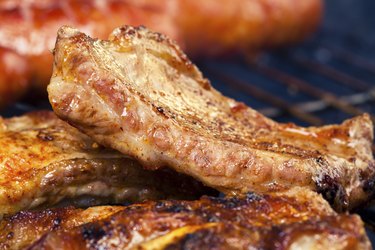
Boiling ribs prior to grilling is a controversial tactic, but effective as a time-saving measure. Technically, the approach is more a case of braising or simmering the ribs in broth to tenderize the meat rather than cooking them at a rolling boil.
Boiling Rationale
Video of the Day
Few champion grillers would advocate boiling their ribs, but braising the ribs first has its disciples. The difference is in the volume and intensity of liquid. Braising uses just a small amount of water or cider vinegar in a tightly sealed environment prior to a low, slow cook. The idea of boiling ribs is an Eastern European idea, even though this is more for a stew than a grilled rib rack. In one Polish recipe, for example, ribs are simmered in beef or chicken stock for 30 minutes on the stove top, then baked in the reduced broth at 375 degrees for 30 minutes, covered with foil. Part of the attraction, apart from saving time, is in reserving the broth afterwards for soup or stock.
Video of the Day
Opposing Camp
Quite simply, boiling sucks out all the juices and flavor in a rib, and is therefore anathema to diehard smokers. The argument that boiling is necessary to tenderize the meat only holds up for cooks planning to undercook their ribs. No rack of ribs will emerge from a smoker anything less than tender and juicy after six hours over a low heat, around 225 F, in the smoker. A better option is to steam the ribs in the oven, particularly for spare ribs, which can be too big to fit in a pressure cooker. Lay the ribs in a baking pan with a cup or two of water, seal it tightly with aluminum foil, and bake for up to an hour at 350 F.
Preparation Ideas
Both spare ribs and baby back ribs are usually sold in a single slab, neither of which will fit in a pot or pressure cooker. Remove the back membrane, as this will curl up and turn rubbery during boiling, and chop the ribs up. The rationale for boiling in vinegar solution, a mix of cider vinegar and water, is that the acid will invigorate the meat and tenderize it.
Boiling in beer is also a worthwhile scenario. Simmer the ribs first in salted water for around 45 minutes, then toss the ribs in a simmered beer-based sauce incorporating sugar, spice, and tomato paste. Leave the ribs to marinate for a few hours before transferring to the grill. The ribs can also be seared first on both sides for a few minutes on the grill, then placed in a pot of beer, broth and spices on a grill rack. Leave to simmer, covered, for about 1½ hours.
Pressure Cook
Boiling the ribs first in the pressure cooker will at least eliminate the possibility of an undercooked center, and will render out some of the surface fat, making flare-ups on the grill less likely. The main advantage, though, is time. Pressure cooking ribs essentially leaves the grilling for the last 10 minutes, a convenient short-cut for those who don't have a whole afternoon to tend the smoker. To pressure cook ribs, cover them (barely) in water and add a teaspoon of salt per cup of water. Add any aromatics or dry rub ingredients too, as well as a dash of vinegar. Seal the lid on the pressure cooker, bring it to full pressure according to the manufacturer's instructions, and then cook for 15-20 minutes. The important next step is to drain the liquid and pat the ribs dry, or they will steam on the grill. Because the ribs will have lost some of their flavor, baste them again with BBQ sauce on the grill.
- Amazing Ribs: The Best Barbecue Ribs You’ve Ever Tasted
- Sun Sentinel: Boiling Tenderizes Barbecue Ribs
- Ricardo Cuisine: BBQ Beer Ribs
- Hip Pressure Cooking: Out of the Pressure Cooker and on to the Grill
- CBS News: For Perfect Ribs, Go Low and Slow
- Fine Cooking: Barbecue Braised Country Spare Ribs with Beer and Mustard Glaze
- Ren Behan: Vodka and Honey Braised Ribs
- The Guardian: How to Cook Perfect Barbecue Ribs